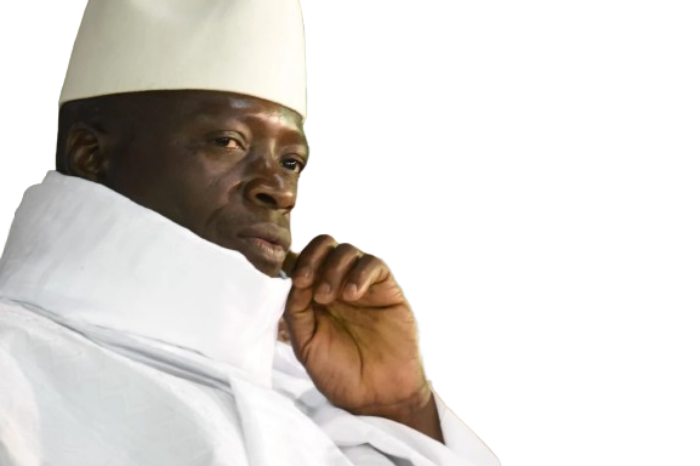Gambiaj.com – (BANJUL, The Gambia) – The APRC No Alliance faction — a splinter group loyal to exiled former President Yahya Jammeh — is experiencing a dramatic and seemingly uncontrollable unraveling, as a string of resignations by senior executive members underscores deep internal instability. At the heart of this disarray lies a growing frustration with Jammeh’s long-distance micromanagement from Equatorial Guinea, which critics in his faction say is crippling the movement’s cohesion and credibility.
The latest blow came on July 18, when Lamin Tamba, the UK-based Director of International Media and Communications for the APRC No Alliance, tendered his resignation.
Tamba, a longtime loyalist and founding figure in the post-2017 resistance wing of the APRC, cited “increased responsibilities” in his personal life but left unmistakable hints of disappointment with the party’s current trajectory.
In his resignation letter addressed directly to Jammeh — styled grandiosely as “His Excellency Sheikh Professor Alhajji Dr Yaya A.J.J Jammeh” — Tamba praised the former leader’s vision and his own role in keeping the APRC “alive and competitive” after the 2016 political transition.
But his final lines were tinged with a subtle plea for discipline, focus, and the rediscovery of “the ingredients that constituted the Green Giant,” implicitly acknowledging the growing dysfunction within the Jammeh-aligned camp.
Tamba’s departure follows closely on the heels of a flurry of other high-profile exits: Fatou Jagne-Jaiteh, the 2nd Deputy Leader appointed only weeks ago; Pa Modou Mbowe, the faction’s longtime spokesman; and Aisha Cole, the Deputy Treasurer.
All three resigned within a 24-hour period earlier this week, sending shockwaves through the party’s grassroots supporters and intensifying speculation of a broader crisis within the movement.
Sadibou Badjie, who was only recently appointed by Jammeh on July 9 as the new Director of Press and Media Relations, sought to downplay the resignations.
Speaking to journalists, Badjie called the departures “unexpected” but brushed them off as part of “normal political life.” Still, he offered no substantive explanation for the resignations, instead suggesting that only the individuals who left could speak to their reasons.
In an attempt to project stability, Badjie disclosed that Jammeh had already appointed a replacement for Jagne-Jaiteh — one Mr. Seedy KA Sanyang, a US-based loyalist. But observers say these reactive appointments reflect a deeper malaise in a party operating without institutional cohesion and under the whims of a remote and autocratic figurehead.
The Jammeh Problem
Since fleeing into exile in 2017 after a regional military intervention ousted him for refusing to concede electoral defeat, Yahya Jammeh has remained a central figure in Gambian politics — more as a symbol than as a strategist.
His refusal to endorse the alliance between the main APRC party and President Adama Barrow’s National People’s Party (NPP) in 2021 led to the formation of the No Alliance faction, which controversially partnered instead with the Gambia Democratic Congress (GDC) led by Mama Kandeh.
From his villa in Malabo, Jammeh has continued to hand-pick party operatives and issue sweeping directives, often through late-night phone calls and audio recordings circulated on social media.
While this sustained loyalty among a small base of hardline supporters, it has also alienated many within the ranks, especially those seeking a more pragmatic and transparent political agenda.
Critics within the No Alliance faction argue that Jammeh’s authoritarian and erratic decision-making has turned the APRC No Alliance into a revolving door of disillusionment.
His tendency to bypass internal consultation and replace executives on a whim has reportedly bred resentment, stagnation, and confusion, especially among diaspora members who feel reduced to mere tokens of loyalty rather than partners in leadership.
A Movement in Freefall
The wave of resignations is more than just symbolic. It signals a structural collapse of a movement that once claimed to be the true torchbearer of Jammeh-era development and ideology.
The exodus of seasoned figures like Tamba — who was instrumental in shaping the faction’s international media strategy — leaves the group rudderless and increasingly irrelevant in the face of more organized opposition parties.
Moreover, it reveals a fundamental contradiction at the heart of the APRC No Alliance: a party built on the charisma and control of a leader in exile, yet unable to function without local adaptability and democratic leadership norms.
As prominent members leave, the faction appears to be imploding under the weight of its contradictions — loyalty versus viability, nostalgia versus reinvention, and Jammehism versus reality.
For now, Jammeh remains the undisputed spiritual leader of his dwindling faction, but the veneer of unity is quickly cracking. With the next electoral cycle already looming and APRC No Alliance struggling to maintain internal coherence, the question many are asking is not whether more resignations will follow, but whether the group can survive at all.
Meanwhile, the APRC No Alliance may soon find itself not only out of power but out of relevance — the final casualty of a political legacy it was supposed to preserve.










